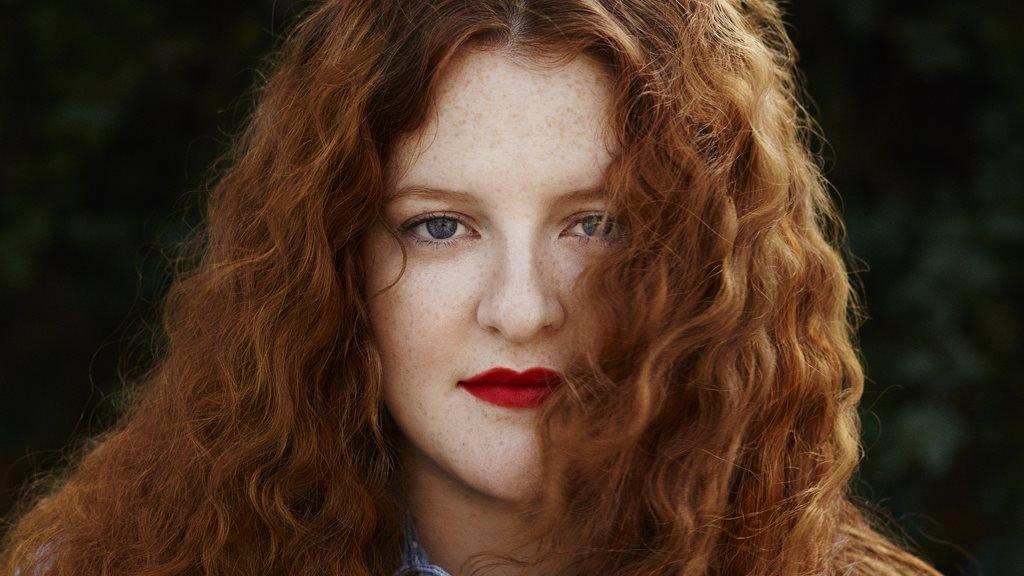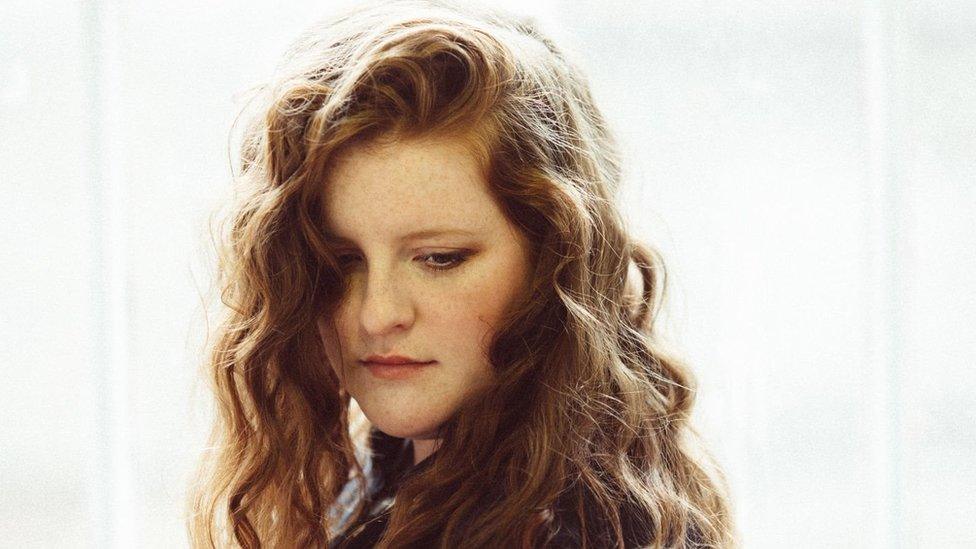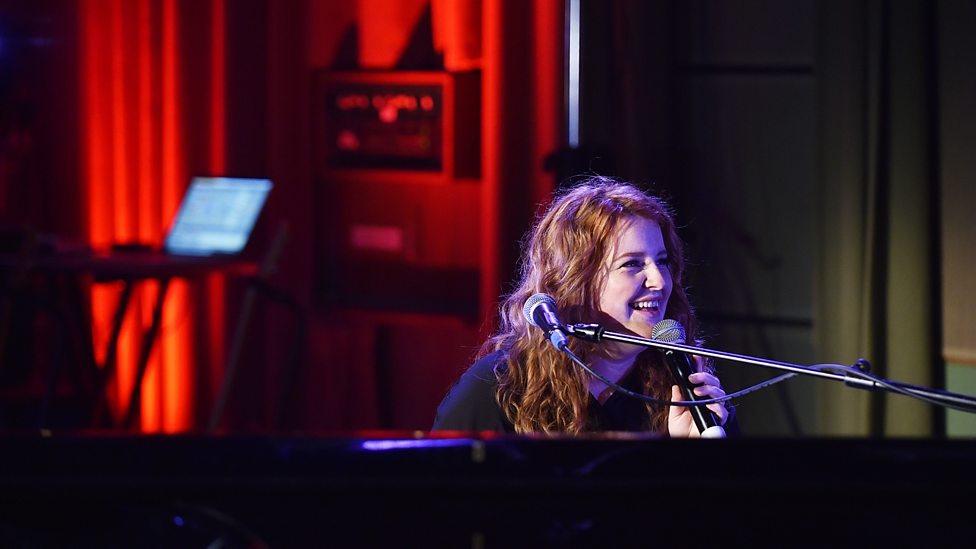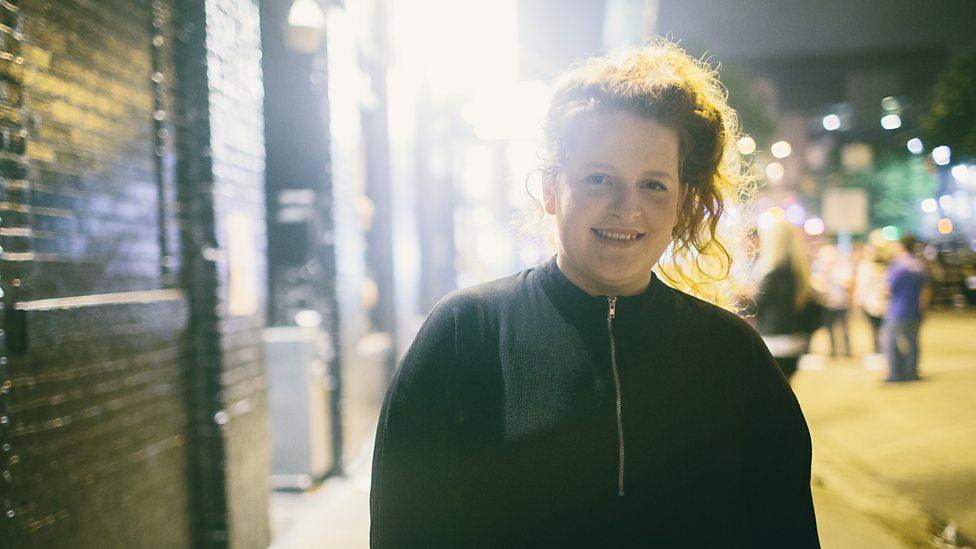Frances reveals Paul McCartney's songwriting tips
- Published

The singer started learning violin as a child, but decided to become a singer-songwriter
Beware of Frances: She's on a one-woman mission to force all the water in your body out through your tear ducts.
Nominated for the Brits critics' choice award and the BBC Sound of 2016, the singer has a knack for achingly beautiful ballads that tug at the heartstrings.
Songs like Let It Out and Say It Again have earned her more than 50 million streams on Spotify - and top 10 singles around the world (although not at home, thanks to the current state of the UK singles chart).
Born Sophie Frances Cooke in Berkshire, she was an aspiring violinist when her teacher sent her to see a film composer for career advice.
On a whim, she played him a pop song she'd written for fun - and moved him to tears.
"It was a bit awkward," she recalls. "I was like, 'Are you ok?' and he said, 'Yeah. But you need to do that. You have to do that for the rest of your life."
She took his advice - choosing to attend the pop-focussed Liverpool Institute of Performing Arts instead of her original choice, the Birmingham Conservatoire.
By the time she reached her third year of studies, she'd already been signed by a record label and moved to London.
Her debut album, Things I've Never Said, comes out this week. A warm and wistful collection of perfectly-crafted piano pop, it has already won the singer comparisons to Adele and Carole King.
Meanwhile, her single Grow has been selected to soundtrack a new campaign by Refuge, the charity supporting female victims of domestic violence.
The 23-year-old sat down to tell the BBC about that video; the perks of fame; and what it's like to get school lessons from Paul McCartney.
Frances plays the BBC Introducing Stage at Glastonbury 2016
Hello Frances... Or should I call you Sophie?
I'm Sophie to my family and friends - but I once thought, "If I'm going to be an artist, my name's got to look good on a piece of paper". Sophie is very curly, it looks very young, whereas Frances is a lot more angular. So it just kind of stuck.
But then up until the age of 16, everyone called me Cookie. So anything goes.
It's been three years since your first single - you must be relieved the album is finally out?
I'm so excited. It's definitely been a while. I wrote some of these songs when I was 18 or 19, and so they've literally been with me for five years.
It's unusual for people to stay fond of the songs they wrote in their teens.
Actually, at the time, I didn't think much of them! But they made it through all the label cuts and slashes. They stood the test of time.
What are the oldest ones on there?
I wrote Drifting, external and Sublime, external in my room at LIPA - the performing arts school up in Liverpool.
That's the one that Paul McCartney founded, right? Did he ever show up?
A couple of times. He'd come in to do little Q&As.
He was really nice, if you saw him walking past, you could just say "hi" and he was always really sweet.
What's the best advice you got from him?
He said that when he and John [Lennon] were writing, they didn't have anything to record what they were doing… Whereas now, if I'm writing in a session, I've got my phone there recording everything. And so if I forget something I can go back and find it.
But he said, "We didn't have that luxury. So if we forgot something, it wasn't good enough and we didn't use it."
I was like, "Oh my God, that's so true." Because if you've written something and 10 minutes later you don't remember it, then it's not good enough.
Do you stick to that advice even now?
No, because my memory's terrible!
Watch an excerpt for Frances' video for Grow
One of the first songs you released was Grow... and that's now being used in a very powerful video for Refuge.
It's amazing. It's about a woman called Melanie Clark, who had a terrible time, a really abusive partner, and she managed to get out of it by seeking help from Refuge.
They've animated her story. It's basically about her feeling invisible until one woman, who represents Refuge, notices her for the first time. It's a campaign to encourage victims of domestic abuse to seek help. We want people to realise they are not alone.
The original song isn't about domestic abuse at all. Were you surprised by how well the words and the images complement each other?
It's weird how the lyrics make so much sense alongside the story. I just hope it will resonate with people all over the world. It's an amazing animation and everyone's done it for free.

The singer has collaborated with Disclosure and Spice Girls writer Biff Stannard - but is keeping those songs for a later record
Would it be fair to say you've always wanted to play music?
Absolutely. My best friend's parents were professional violinists. When I was about eight, I went round to her house, picked one up and fell in love with it. Then her dad taught me all the way up 'til I was about 16 or 17.
What grade did you get?
Eight. I absolutely loved it.
What was your exam piece?
I did a kind of a gypsy piece called Csardas, external. It's so fast - and it speeds up towards the end, as well. And then I started the piano when I was 10 - but I only got to grade six. I couldn't be bothered to do scales any more.
Do you remember your first stage performance?
I was three, dressed as an ice cream in a production of The Hungry Caterpillar at the Royal Festival Hall! And then throughout school, I was always on stage, playing violin or piano. And I played in the Berkshire Youth Orchestra.
Frances performs Grow at the BBC Introducing SXSW showcase in 2016.
You sound like a high achiever. Were you good academically, too?
I was quite lucky at school. I had this little charm - I could not do my homework and somehow get away with it.
Everyone knew I worked so hard at music. I was doing stuff after school every day, so the teachers were quite lenient.
And then you went to LIPA...
Actually, I didn't get in the first time. They put me on their foundation course, which cost like 10 grand or something. My parents, bless them, scrambled together every penny we had and I worked at Waitrose trying to get money to go.
How did you get signed?
I put a song called Coming Up For Air, external on SoundCloud in early 2014. It was quite calculated - because at the time London Grammar were really big, so I thought, "OK, I'm going to write something like that, so all the blogs listen and pick up on it". Eventually, a few started writing about it and then Tom Robinson from 6 Music played it which was really cool.
After that, we ended up having a meeting with [boutique record label] Kitsuné, and released a single.
Don't Worry About Me was a big breakthrough for you. How did that come about?
One of my friends was quite ill - and I wrote the song to say, "look after yourself and I'll be here for you".
I wrote it really quickly. I was just getting off the bus on Kilburn High Road when I came up with the phrase, "I'll feel the fear for you, I'll cry the tears for you, don't worry about me." I ran home thinking, "I need to get to a piano quickly, I don't want to lose this."
It's a very emotional performance.
I think because I wrote it so quickly. I was thinking about my friend and the lyrics just came out.

The star has been compared to Adele and Carole King
Don't Worry About Me has been played nine million times on Spotify. How do you wrap your head around that?
I don't really. I always said that if I won the lottery, I'd be more excited by £100,000 than I would with £1m because I can't understand a million pounds. I've never seen that. I can't quantify it. Whereas a hundred grand, I can think, "ah, that's a really nice car".
It's a weird period for music at the moment… You can have all those plays, and millions of people know your song, but it hasn't troubled the charts in the UK.
It's a really weird time. In Belgium, Don't Worry About Me was in the top 20 for 10 weeks and that's mainly because in Belgium the singer-songwriter world is their Radio 1. In Australia, it hung around the chart for ages. In the UK, I've just come out at a really funny time. There's a weird limbo.
But I'm so proud of my album. I know it's not going to sell 20 million copies but that's OK. I want to be an artist that's going to be around for 20 or 30 years.
In a strange way, you're famous to the people who know you and nobody else.
It's actually lovely because I can walk down the street and not be bothered. Apart from in John Lewis once, where the manager recognised me while I was buying a sofa.
He was like, "Excuse me, can I ask you a question?" and I thought, "Oh no, my card's been rejected" but he was like, "Can I get a picture with you?"
And I think he paid for my sofa because I took out finance and I haven't paid a penny yet.
That's a proper celebrity discount!
Totally. 100% off!

Follow us on Facebook, external, on Twitter @BBCNewsEnts, external, or on Instagram at bbcnewsents, external. If you have a story suggestion email entertainment.news@bbc.co.uk, external.

- Published21 March 2016
